While oncologists increasingly use liquid biopsies for genomic testing, many still have concerns that a negative result from liquid biopsy may not be meaningful enough to direct clinical decision making. This concern can be mitigated by Foundation Medicine’s new circulating tumor DNA tumor fraction which improves confidence in the meaning of a negative result from liquid biopsies.

Knowledge Center
A precision oncology resource featuring curated cancer genomic-focused educational content with medical professionals. Stay up-to-date on this ever-expanding field.
Meet our Experts
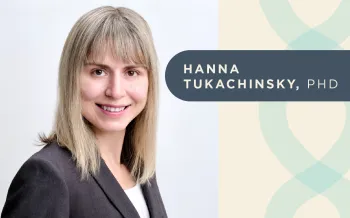
Hanna Tukachinsky, PhD
Hanna Tukachinsky is a Sr. Translational Scientist in Clinical Development and joined Foundation Medicine, Inc. in 2020. Dr. Tukachinsky is interested in molecular mechanisms that drive oncogenesis in different tissues and in emerging biomarkers for therapeutics. She received her BA from Columbia University and PhD from Harvard Medical School.
Optional Links

Lincoln Pasquina, PhD
Lincoln Pasquina is Director of Clinical Development at Foundation Medicine, Inc. Dr. Pasquina oversees evidence generation, planning, and execution for comprehensive genomic profiling assays with a focus on tissue-agnostic monitoring. He earned his BS from MIT and PhD from Harvard Medical School.
Optional Links

Jessica Lee, MS
Jessica Lee joined Foundation Medicine, Inc. in 2018 and is currently a Data Scientist in the Clinical Development Department. She earned a BS in Computational Neuroscience and an MS in Biomedical Engineering from Carnegie Mellon University.
Optional Links
ctDNA Tumor Fraction
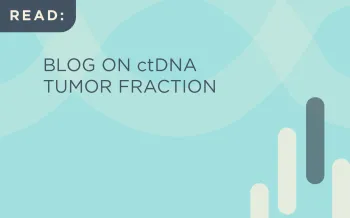
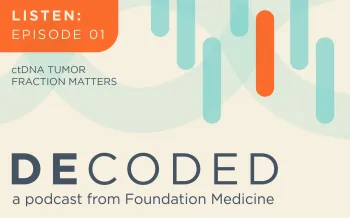
Decoded – Episode 1: ctDNA Tumor Fraction Matters When Interpreting Liquid Biopsy Test Results
Lincoln Pasquina, PhD, Director of Clinical Development at Foundation Medicine, explains how physicians can leverage Foundation Medicine’s ctDNA tumor fraction to improve clinical care. ctDNA tumor fraction is a measure of how much ctDNA is measured in an individual liquid biopsy.

Measurement of ctDNA tumor fraction identifies informative negative liquid biopsy results and informs value of tissue confirmation
See the highlights of this peer-reviewed article from Clinical Cancer Research in a brief animated publication summary. Watch the video to learn how Foundation Medicine's ctDNA tumor fraction can distinguish whether tumor-derived DNA is present in a liquid biopsy sample. Using the ctDNA tumor fraction threshold of 1%+, providers can have increased confidence in negative results on a liquid biopsy.
Fusion Detection
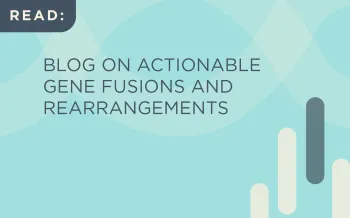
Genomic Testing to Identify Targetable Fusions in Liquid Biopsies
FoundationOne®Liquid CDx analyzes multiple classes of genomic alterations in DNA to identify genetic drivers of cancer, including point mutations, short insertions and deletions, rearrangements, gene deletions and amplifications. The real advantage of DNA as an analyte is that DNA is highly stable and can survive in tissue even if the tissue is archival and has been biopsied many years previously. Likewise, DNA does not degrade quickly in the blood. While RNA analysis can certainly add value to tissue biopsies, robust DNA sequencing still dominates in both tissue and liquid biopsies.
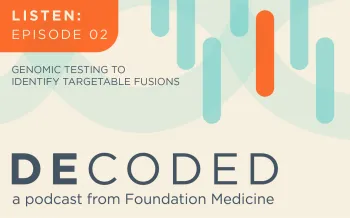
Decoded – Episode 2: Genomic Testing to Identify Targetable Fusions in Liquid Biopsies
Hanna Tukachinsky, PhD, and Jessica Lee, MS, are co-authors on a recently published paper titled “Circulating Tumor DNA Enables Sensitive Detection of Actionable Gene Fusions and Rearrangements Across Cancer Types.” Listen to their latest research on fusion detection and what their findings mean for clinicians.

Circulating tumor DNA enables sensitive detection of actionable gene fusions and rearrangements across cancer types
See the highlights of this peer-reviewed article from Clinical Cancer Research in a brief animated publication summary. Watch the video to learn how the frequency of detection of pathogenic rearrangements was comparable in liquid biopsies with a ctDNA tumor fraction 1%+ to those detected in tissue biopsies. ctDNA tumor fraction also helps differentiate between truncal driver rearrangements and subclonal events that may represent acquired resistance or other tumor heterogeneity.
Additional Notes
The content in the Knowledge Center is education provided by our commercial team and is not medical education or advice.
FoundationOne®CDx and FoundationOne®Liquid CDx are qualitative next-generation sequencing based in vitro diagnostic tests for advanced cancer patients with solid tumors and are for prescription use only. FoundationOne CDx utilizes FFPE tissue and analyzes 324 genes as well as genomic signatures. FoundationOne Liquid CDx analyzes 324 genes utilizing circulating cell-free DNA and is FDA-approved to report short variants in 311 genes. The tests are companion diagnostics to identify patients who may benefit from treatment with specific therapies in accordance with the therapeutic product labeling. Additional genomic findings may be reported and are not prescriptive or conclusive for labeled use of any specific therapeutic product. Use of the tests does not guarantee a patient will be matched to a treatment. A negative result does not rule out the presence of an alteration. Some patients may require a biopsy for testing with FoundationOne CDx when archival tissue is not available which may pose a risk. Patients being considered for eligibility for therapy based on detection of NTRK1/2/3 and ROS1 fusions should only be tested if tissue is unavailable. Patients who are tested with FoundationOne Liquid CDx and are negative for other companion diagnostic mutations should be reflexed to tumor tissue testing and mutation status confirmed using an FDA-approved tumor tissue test, if feasible. For the complete label, including companion diagnostic indications and important risk information, please visit www.F1CDxLabel.com and www.F1LCDxLabel.com.